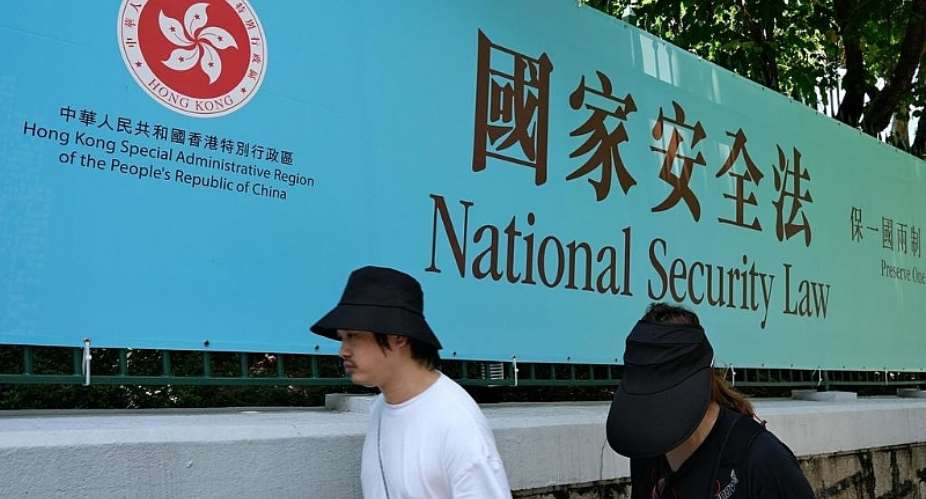Hong Kong police arrested 53 former lawmakers and democracy activists on Wednesday for allegedly violating the new national security law by participating in unofficial election primaries for the territory's legislature last year.
The mass arrests, including of former lawmakers, were the largest move against Hong Kong's democracy movement since the law was imposed by Beijing last June to quell dissent in the semi-autonomous territory.
“The operation today targets the active elements who are suspected to be involved in the crime of overthrowing, or interfering (and) seriously destroy the Hong Kong government's legal execution of duties,” said John Lee, Hong Kong's security minister, in a news conference.
He said those arrested were suspected of trying to paralyze the government, via their plans to gain a majority of the seats in the legislature to create a situation in which the chief executive had to resign and the government would stop functioning.
In a video released by former lawmaker Lam Cheuk-ting on his Facebook page, police turned up at his house and told him he was “suspected of violating the national security law, subverting state power.” Police told those recording the video to stop or risk arrest.
Legislative elections
The legislative election that would have followed the unofficial primaries was postponed by a year by Hong Kong Chief Executive Carrie Lam, who cited the public health risks during the coronavirus pandemic. Mass resignations and disqualifications of pro-democracy lawmakers have left the legislature largely a pro-Beijing body.
Lee said the police would not target those who had voted in the unofficial primaries, which were held in July last year and attracted more than 600,000 voters even though pro-Beijing lawmakers and politicians had warned the event could breach the security law.
All of the pro-democracy candidates in the unofficial primaries were arrested, according to tallies of the arrests being reported by the South China Morning Post, online platform Now News and political groups.
Occupy Central
At least seven members of Hong Kong's Democratic Party — the city's largest opposition party — were arrested, including former party chairman Wu Chi-wai. Former lawmakers Lam, Helena Wong and James To were also arrested, according to a post on the party's Facebook page.
Benny Tai, a key figure in Hong Kong's 2014 Occupy Central protests and a former law professor, was also arrested, reports said. Tai was one of the main organizers of the primaries.
The home of Joshua Wong, a prominent pro-democracy activist who is serving a 13 1/2-month prison sentence for organizing and participating in an unauthorized protest last year, was also raided, according to a tweet posted from Wong's account.
Subverting state power
Senior superintendent Steve Li from the national security unit said in a news conference that 53 people — 45 men and eight women aged between 23 to 64 — were arrested in an operation that involved 1,000 officers.
Six were arrested for subverting state power by organizing the unofficial primaries, while the rest were arrested for allegedly participating in the event, Li said. He said more arrests could be made and investigations were ongoing.
In recent months, Hong Kong has already jailed several pro-democracy activists including Wong and Agnes Chow for their involvement in anti-government protests, and others have been charged under the national security law including media tycoon and outspoken pro-democracy activist Jimmy Lai.
Draconian blanket law
Human Rights Watch said the arrests suggest Beijing has failed to learn that repression generates resistance. HRW senior China researcher Maya Wang said in a statement that "millions of Hong Kong people will persist in their struggle for their right to vote and run for office in a democratically elected government.”
In further remarks to The Associated Press, Wang said it wasn't clear what provisions of the law were being cited to justify the arrests, but that local authorities seem less concerned with legal substance.
“The very nature of the national security law is as a draconian blanket law allowing the government to arrest and potentially imprison people for long terms for exercising their constitutionally protected rights,” Wang said.
“The veneer of rule of law is also applied in mainland China stripped of any meaning. Hong Kong is looking more like mainland China but where one ends and the other begins is hard to discern,” she said.
(With AP)





 Akufo-Addo commissions Phase II of Kaleo solar power plant
Akufo-Addo commissions Phase II of Kaleo solar power plant
 NDC panics over Bawumia’s visit to Pope Francis
NDC panics over Bawumia’s visit to Pope Francis
 EC blasts Mahama over “false” claims on recruitment of Returning Officers
EC blasts Mahama over “false” claims on recruitment of Returning Officers
 Lands Minister gives ultimatum to Future Global Resources to revamp Prestea/Bogo...
Lands Minister gives ultimatum to Future Global Resources to revamp Prestea/Bogo...
 Wa Naa appeals to Akufo-Addo to audit state lands in Wa
Wa Naa appeals to Akufo-Addo to audit state lands in Wa
 Prof Opoku-Agyemang misunderstood Bawumia’s ‘driver mate’ analogy – Miracles Abo...
Prof Opoku-Agyemang misunderstood Bawumia’s ‘driver mate’ analogy – Miracles Abo...
 EU confident Ghana will not sign Anti-LGBTQI Bill
EU confident Ghana will not sign Anti-LGBTQI Bill
 Suspend implementation of Planting for Food and Jobs for 2024 - Stakeholders
Suspend implementation of Planting for Food and Jobs for 2024 - Stakeholders
 Tema West Municipal Assembly gets Ghana's First Female Aircraft Marshaller as ne...
Tema West Municipal Assembly gets Ghana's First Female Aircraft Marshaller as ne...
 Dumsor is affecting us double, release timetable – Disability Federation to ECG
Dumsor is affecting us double, release timetable – Disability Federation to ECG
